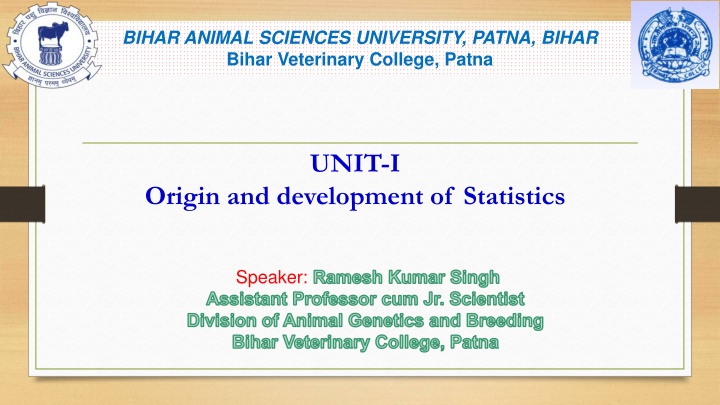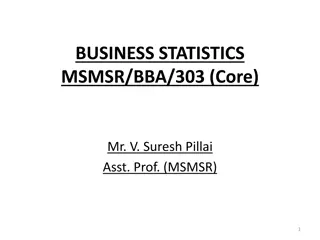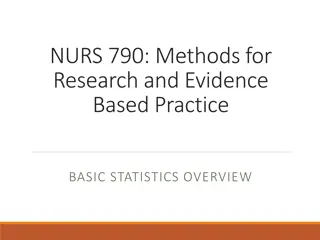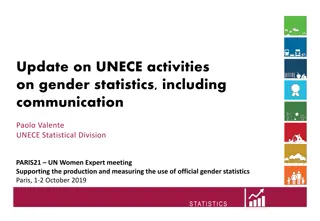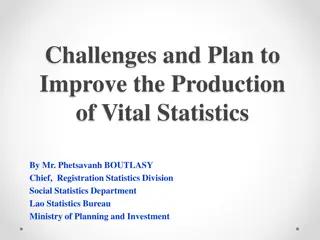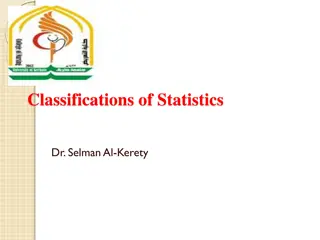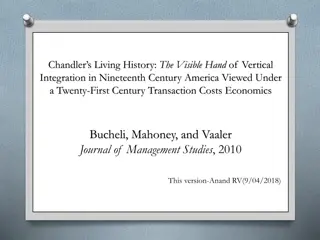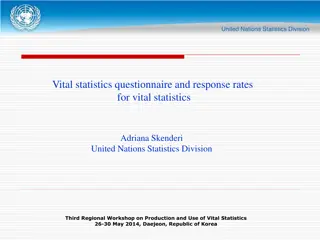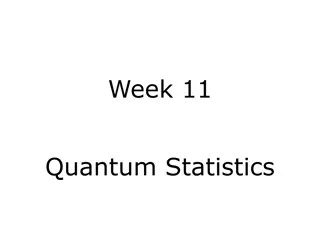Evolution of Statistics: A Historical Perspective
Statistics, originating from ancient civilizations like Egypt and India, has evolved as a crucial science for data collection, analysis, and decision-making. This field traces its roots to the management of state affairs and has developed into a vital tool for interpreting numerical data to draw meaningful inferences. Key figures such as R. A. Fisher have contributed to shaping the modern understanding of statistics, which relies on data as its foundation for informed decision-making.
Download Presentation

Please find below an Image/Link to download the presentation.
The content on the website is provided AS IS for your information and personal use only. It may not be sold, licensed, or shared on other websites without obtaining consent from the author.If you encounter any issues during the download, it is possible that the publisher has removed the file from their server.
You are allowed to download the files provided on this website for personal or commercial use, subject to the condition that they are used lawfully. All files are the property of their respective owners.
The content on the website is provided AS IS for your information and personal use only. It may not be sold, licensed, or shared on other websites without obtaining consent from the author.
E N D
Presentation Transcript
BIHAR ANIMAL SCIENCES UNIVERSITY, PATNA, BIHAR Bihar Veterinary College, Patna UNIT-I Origin and development of Statistics Speaker: Ramesh Kumar Singh Assistant Professor cum Jr. Scientist Division of Animal Genetics and Breeding Bihar Veterinary College, Patna
It is as old as human society origin. It was regarded as Science of state craft & was product of administration of the state. In ancient times, state used to collect the data on population with age & sex wise, property & wealth of country. Word statistics seems to be derived from Latin word Status ; Italian word Statista ; German word Statistic ; French word Statistique ; each of which mean a political State.
One of earliest census of wealth & population was conducted by Pharaohs (Emperors) of Egypt for construction of pyramids. Later used by many countries. In India, Chandragupta Maurya Arthashastra was a statistical record. Records of land, Agriculture & wealth statistics was maintained by Todermal (Akbar Reign 1556-1605 A.D.) Also in Ain-e-Akbari by Abul Fazl (1596-97) R. A. Fisher Father of Statistics (324-300B.C.) Kautilya
Statistics Statistics when used as plural Means numerical set of data. When used as Singular it means the science of statistical methods embodying the theory and technique used for collection, analysis and drawing inferences from the numerical data. Statistics may be defined as the science of collection, presentation analysis and interpretation of numerical data.
Statistics Definitions L. Boddington defined Statistics is the science of estimates and probabilities . Croxton and Cowden defined Statistics may be defined as the collection, presentation, analysis and interpretation of numerical data. Walls and Roberts defined Statistics may rightly be regarded as a body of methods for making wise decisions in the face of uncertainly .
Contd R. A. fisher defined the science of Statistics is essentially a branch of applied mathematics and may be regarded as mathematics applied to observational data . Statistics is considered as science of decision making under uncertainty with or without data . Statistics require data as a raw material upon which its methods or techniques applied to arrive at inferences to make wise decisions.
Limitations of Statistics Statistics does not study qualitative phenomenon. Statistics does not study individual. Statistical laws are not exact. Statistics is liable to be misused.
Thanking You Thanking You
